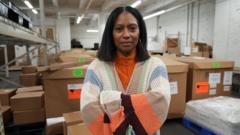With Donald Trump poised to reintroduce tariffs on imports, small businesses like MinkeeBlue are scrambling to adapt. Owners are stockpiling goods, reassessing suppliers, and bracing for potential price increases that could reshape the retail landscape.
Small Businesses Brace for Trump's Expected Tariffs

Small Businesses Brace for Trump's Expected Tariffs
Entrepreneurs across the U.S. respond to looming trade policies as they navigate potential economic impacts and shifts in supply chains.
The impending reintroduction of Donald Trump's tariffs has prompted U.S. businesses to take preemptive measures in a rapidly changing economic environment. Notably, Sherrill Mosee, the founder of handbag company MinkeeBlue based in Philadelphia, has felt the pressure of Trump's recent campaign announcements. After initially putting orders on hold for approximately 2,700 handbags from China, she is now expediting their influx due to the looming tariff threats associated with Trump’s re-election.
Trump has indicated that, should he assume the presidency again, a 25% tariff will be imposed on goods from Mexico and Canada, along with an additional 10% on imports from China. These proposals echo his past policies, which faced criticism for raising consumer prices while failing to significantly bolster U.S. manufacturing jobs.
As the risk of renewed tariffs intensifies, businesses are taking every precaution possible. Industry leaders, such as the footwear company Steve Madden, have already begun plans to relocate manufacturing out of China to mitigate the impact. According to Chris Caton, managing director for global strategy and analytics at Prologis, an increase in commercial warehouse activity has been observed as companies look to stockpile goods.
Compounding this economic anxiety is the sentiment that even if these tariffs do not materialize, fear of potential shortages and rising prices could stifle consumer markets. Wendy Edelberg, an economist with the Hamilton Project, emphasizes that uncertainty alone can inhibit economic growth as businesses rush to adapt.
The ripple effect from these tariffs could hit hard. Martin Pochtaruk, CEO of Canadian solar panel manufacturer Heliene, recalls the devastation his company faced from previous tariffs. Today, his operations consist entirely of U.S.-based manufacturing as he grapples with the competitive landscape reshaped by governmental policies.
In contrast to Trump's assertion that tariffs will rejuvenate U.S. jobs, data suggest the opposite; tariffs might simply raise consumer costs. The National Retail Federation warns the economic impact of such tariffs could amount to billions in additional costs for consumers across various essential goods.
Trump's recent geopolitical maneuvers targeting suppliers such as Mexico raise questions about the coherence of his broader economic objectives. While some experts maintain that protections meant to curb tariffs will limit detrimental outcomes, small business owners like Ms. Mosee find themselves with little resilience against uncertainty. As she considers transitioning her supply chain to other countries like Cambodia and India, while also considering forming partnerships, she poignantly states, “It’s going to be hard.”


















